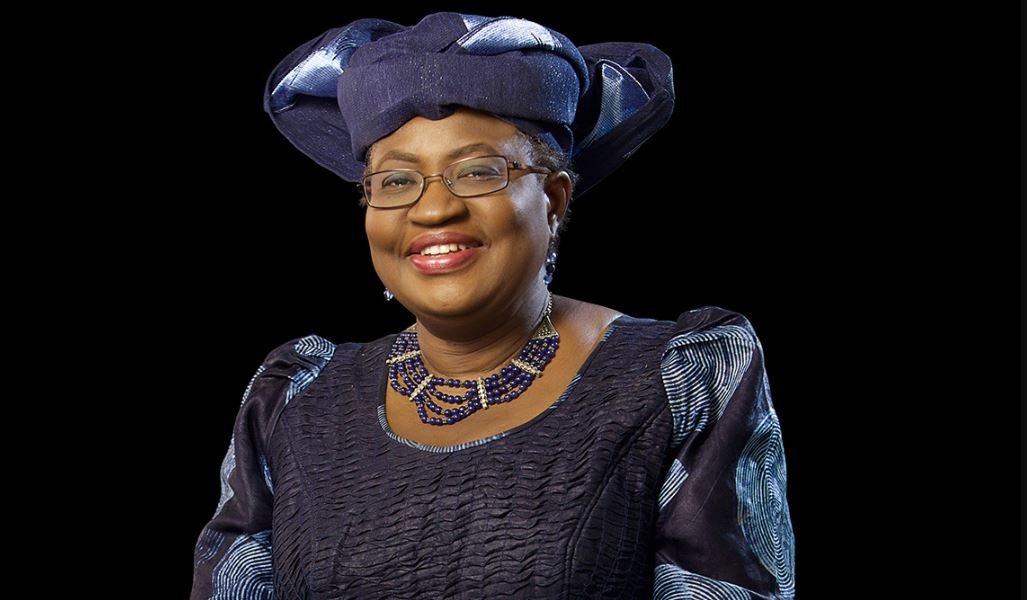This is a comprehensive list of the top 15 female ministers In Nigeria. These are accomplished women who have made major contributions in different government sectors.
READ ALSO: Top 10 Female Senators In Nigeria (2024)
| Name | Position | Years Of Service |
|---|---|---|
| Ngozi Okonjo-Iweala | Minister of Finance | 2003–2006, 2011–2015 |
| Diezani Alison-Madueke | Minister of Petroleum Resources | 2010–2015 |
| Kemi Adeosun | Minister of Finance | 2015–2018 |
| Amina Mohammed | Minister of Environment | 2015–2016 |
| Zainab Ahmed | Minister of Finance & Budget and National Planning, Minister of Finance | 2019–2023 |
| Stella Oduah | Minister of Aviation | 2011–2014 |
| Patricia Akwashiki | Minister of Information | 2015–2015 |
| Hajia Zainab Maina | Minister of Women Affairs | 2011–2015 |
| Dora Akunyili | Minister of Information and Communications | 2008–2010 |
| Adenike Grange | Minister of Health | 2007-2008 |
| Aisha Alhassan | Minister of Women Affairs | 2015–2019 |
| Ramatu Tijjani Aliyu | Minister of State for Federal Capital Territory (FCT) | 2019–2023 |
| Uju Kennedy Ohaneye | Minister of Women Affairs | 2023–present |
| Betta Edu | Minister of Humanitarian Affairs and Poverty Alleviation | 2023–present |
| Imaan Sulaiman-Ibrahim | Minister of State for Police Affairs | 2023–present |
| Joy Ogwu | Foreign Minister of Nigeria | 2006-2007 |
READ ALSO: Top 10 Famous Female Pastors In Nigeria
1. Ngozi Okonjo-Iweala
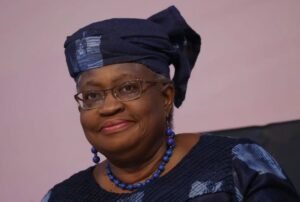
Ngozi Okonjo-Iweala is a respected Nigerian economist, currently serving as the Director-General of the World Trade Organization (WTO). Born on June 13, 1954, in Delta State, Nigeria, she earned degrees from Harvard University and MIT.
Okonjo-Iweala served as Nigeria’s Minister of Finance twice, from 2003 to 2006 and 2011 to 2015. She introduced important economic reforms to improve Nigeria’s finances.
One of her most notable achievements was helping Nigeria secure debt relief from the Paris Club, which led to the cancellation of over $30 billion in debt.
She also played a key part in establishing the Nigerian Sovereign Investment Authority. Okonjo-Iweala has also worked at the World Bank and serves on several international boards.
2. Diezani Alison-Madueke
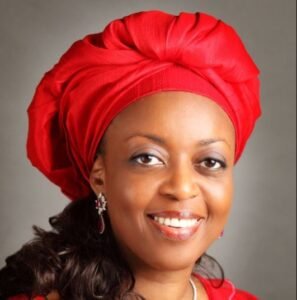
Diezani Alison-Madueke is a Nigerian oil and gas expert. She was born on December 6, 1960, and served as Minister of Petroleum Resources from 2010 to 2015.
She was the first woman to become President of the Organization of the Petroleum Exporting Countries (OPEC). However, she was also the Minister of Transportation and Minister of Mines and Steel Development. Alison-Madueke strived to improve Nigeria’s oil sector by supporting local industries and stabilizing the fuel supply.
She also helped draft the Petroleum Industry Bill, which aimed to bring more transparency to the oil industry. Yet, her tenure was surrounded by controversy, and she faced allegations of corruption, especially regarding oil contracts.
3. Kemi Adeosun
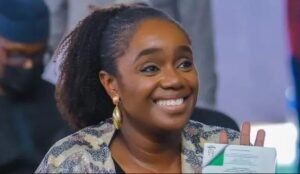
Kemi Adeosun is a Nigerian economist and politician. She was born on March 9, 1967, in London, UK. Adeosun served as Nigeria’s Minister of Finance from 2015 to 2018. She studied Economics at the University of East London.
Before becoming a minister, Adeosun worked in both public and private sectors and was the Commissioner for Finance in Ogun State. As Minister of Finance, she focused on reducing Nigeria’s dependency on oil by promoting economic reforms.
She helped develop the Economic Recovery and Growth Plan (ERGP) to boost infrastructure and investment. Adeosun also worked on tax reforms to increase revenue for the country. Her term as minister ended due to a controversy about her National Youth Service Corps (NYSC) certificate.
READ ALSO: Top 10 Richest States In Nigeria By GDP (2024)
4. Amina Mohammed
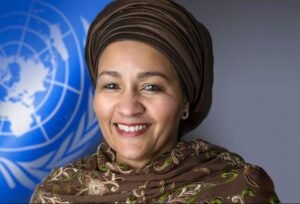
Amina Mohammed is a Nigerian politician and diplomat. Born on June 27, 1961, in Jalingo, Taraba State, she served as Nigeria’s Minister of Environment from 2015 to 2016.
She focused on environmental policies and promoting sustainable development. Her efforts helped Nigeria become more involved in global agreements on climate change, such as the Paris Agreement.
In 2017, Amina Mohammed was appointed Deputy Secretary-General of the United Nations, where she continues to work on global issues like sustainable development, climate action, and gender equality. Her work at the UN has expanded her influence, making her one of Nigeria’s most respected international figures.
5. Zainab Ahmed
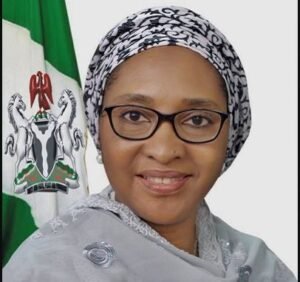
Zainab Ahmed, born on April 16, 1960, is Nigeria’s current Minister of Finance, Budget, and National Planning, a role she has held since 2019. She has a background in Accounting, having studied at Ahmadu Bello University.
Ahmed has vast experience in both the public and private sectors, serving as Minister of Finance. Ahmed has played a big part in helping Nigeria through its economic challenges, especially during the COVID-19 pandemic. She has also worked on tax reforms and policies to stabilize the economy during periods of low oil prices.
6. Stella Oduah
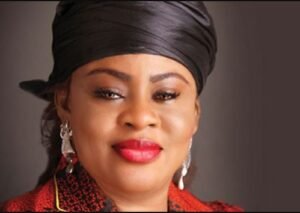
Stella Oduah, born on January 5, 1962, in Anambra State, is a well-known politician and businesswoman. From 2011 to 2014, she served as Nigeria’s Minister of Aviation.
Stella holds a degree in Accounting and an MBA from the University of the District of Columbia. Before joining politics, she worked in the private sector.
During her time as the Minister of Aviation, she helped upgrade several airports and put new safety regulations in place. Her work was notable, but her time in office was also filled with controversy, especially over the purchase of expensive bulletproof vehicles.
READ ALSO: List Of Vice Presidents Of Nigeria (1966-Present)
7. Patricia Akwashiki
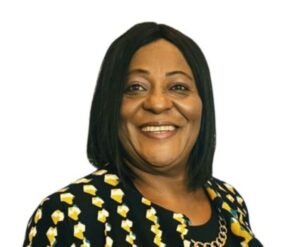
Born on November 2, 1953, in Nasarawa State, Patricia Akwashiki is a Nigerian politician. She served as a Senator from 2007 to 2011, representing Nasarawa North. In 2015, she became Nigeria’s Minister of Information.
Patricia has a degree in Education from Ahmadu Bello University, and she has worked in banking. When she was a Senator, she supported policies that helped women and young people.
Though her time as a Minister of Information was short, she improved government communication and promoted national unity. Patricia has expressed interest in running for governor of Nasarawa State.
8. Hajia Zainab Maina
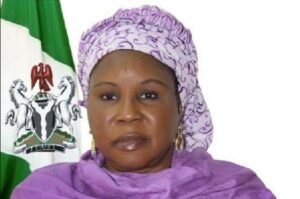
Hajia Zainab Maina, born on May 1, 1969, served as Minister of Women Affairs from 2011 to 2015. Maina studied Sociology at the University of Maiduguri, and throughout her career, she has focused on supporting women’s rights and fighting for gender equality.
During her time, she helps women become financially independent and fight issues like gender-based violence. Maina also worked with international organizations to support health and education programs for women. Her time as Minister made a big impact, and she continues to be a strong voice for women in Nigeria.
9. Aisha Alhassan
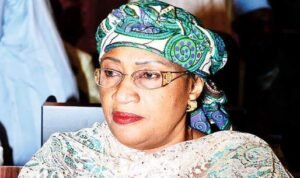
Aisha Alhassan, known as “Mama Taraba,” was born on July 24, 1960, in Taraba State. She was the Minister of Women Affairs from 2015 to 2019 under President Buhari’s government.
Aisha studied Law at the University of Maiduguri, and before she became Minister, she was a senator representing Taraba North. During her time, she pushed for better access to education and healthcare.
READ ALSO: List Of Presidents Of Nigeria (1963-Present)
10. Ramatu Tijjani Aliyu
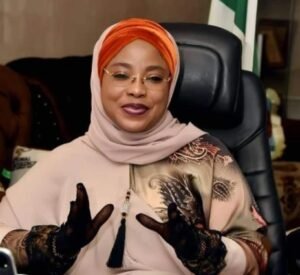
Ramatu Tijjani Aliyu, born on March 15, 1975, in Kogi State, is a former Minister of State for the Federal Capital Territory (FCT). She studied Political Science at the University of Jos.
Ramatu Tijjani Aliyu was the National Women Leader of the All Progressives Congress (APC) before she became a minister. Ramatu had an impact on urban development and fights for better services for poor communities. She also launched several programs to help women take on leadership roles.
11. Adenike Grange
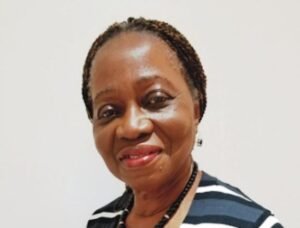
Adenike Grange was Nigeria’s Minister of Health from 2007 to 2008 under President Umaru Yar’Adua. She is a medical doctor and public health expert with years of experience.
During her time as minister, Grange improved healthcare services in Nigeria. She focused on building better health facilities and making sure more people had access to important medicines. Grange also wanted to make sure that healthcare was not just for treatment but also for prevention.
She supported programs like the National Health Insurance Scheme and fought for more funding for health programs. Grange also played a key part in Nigeria’s battle against diseases like malaria and HIV/AIDS.
12. Uju Kennedy Ohaneye
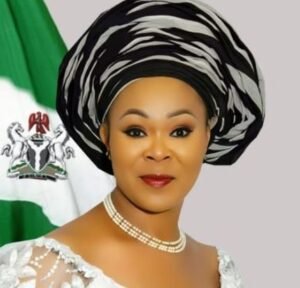
Uju Kennedy Ohaneye is the current Minister of Women’s Affairs in Nigeria. She was appointed in 2023 by President Bola Ahmed Tinubu. Ohaneye is a lawyer and a strong advocate for women’s rights. Since she took office, she has been working to uplift women across Nigeria.
She has introduced various programs, like offering vocational training and equipment to help women start businesses. Ohaneye is also working to stop gender-based violence and make sure women and children are treated fairly.
She fights against the stigma attached to individuals living with HIV. Her goal is to create more opportunities for women and ensure they have the support they need to grow.
13. Betta Edu
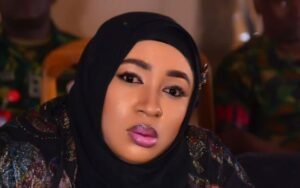
Betta Edu is the current Minister of Humanitarian Affairs and Poverty Alleviation, appointed in 2023 by President Bola Ahmed Tinubu. She is a medical doctor with experience In public health and welfare.
Since becoming minister, Edu has focused on helping the most vulnerable people in Nigeria, including those affected by poverty and disasters. She wants to ensure they have access to basic needs like food, shelter, and healthcare.
Edu also promotes policies that support social inclusion and lift people out of poverty. She is using her healthcare background to bring much-needed change to Nigeria’s humanitarian sector.
14. Imaan Sulaiman-Ibrahim
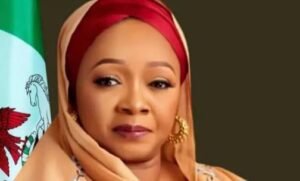
Imaan Sulaiman-Ibrahim is a businesswoman, and the Minister of State for Police Affairs, appointed in 2023 by President Bola Ahmed Tinubu. She is a lawyer and a public servant with a focus on law enforcement.
Since taking office, she has improved the Nigerian Police Force. Sulaiman-Ibrahim aims for better training for officers, upgrading police equipment, and making the police more responsive to the public. She also pushes for reforms to deal with issues like corruption and human rights violations.
15. Joy Ogwu
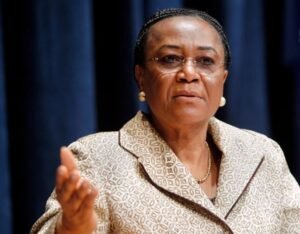
Joy Ogwu, born on August 22, 1946, is a notable Nigerian diplomat. She was Nigeria’s Foreign Minister from 2006 to 2008 and served as the country’s Permanent Representative to the United Nations from 2008 to 2017.
Ogwu was the first Nigerian woman to hold the UN Permanent Representative position. She has also led the Nigerian Institute of International Affairs (NIIA) as Director-General.
Ogwu has been influential in disarmament and promoting African ties with Latin America. She also chaired the board of the United Nations Institute for Disarmament Research.
Academically, Ogwu holds a BA and MA in political science from Rutgers University and a Ph.D. from the University of Lagos. She has been a voice for women’s development and human rights and has published extensively on these topics.

